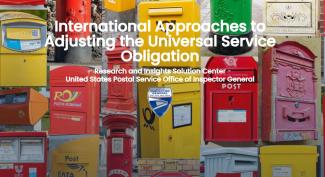International Approaches to Adjusting the Universal Service Obligation
- The universal service obligation (USO) guarantees all citizens within a country affordable, consistent postal service, regardless of location. However, declining mail volume and market competition have made it harder for postal operators worldwide to sustain the costs of providing the USO.
- To address these challenges, many countries are modifying their USOs by reducing delivery days, slowing service standards, changing requirements for the network of post offices, or reducing the scope of products within the USO. Depending on the country, the authority to change the USO may rest in national law, a government ministry, or a postal regulator.
- The United States’ USO legal framework is unique because there is no government department directly responsible for postal policy or a specific formal process to adjust it. Except for the six-day delivery mandate, postal law defines the USO in broad qualitative terms, which allows the Postal Service discretion to interpret the USO and adjust parameters, such as service standards or retail access, to balance service quality and financial sustainability.
- Should a reevaluation of the United States’ USO framework take place in the future, the experience of other countries highlights the value of assessing user needs and engaging stakeholders to promote an evidence-based, transparent approach to reviewing the USO.
The universal service obligation (USO) is a set of requirements that ensures all citizens within a country, regardless of geographic location, access to a basic level of postal service at an affordable price, and with a consistent level of quality. Around the world, declining mail volume and increased competition in the parcel market have impacted postal revenue, making it more difficult to sustain the costs associated with providing the USO.
In response to these market changes, many countries have recognized a need to revisit their USOs and engage in discussion about the future of postal services. This paper looks at 28 countries that have reviewed and adjusted elements of their USO in the past 10 years. Among the changes foreign posts have made are reducing delivery days, slowing service standards, changing requirements for the network of post offices and other access points, and altering the scope of products included under the USO.
In some countries examined, the USO is fully (or in large part) defined in national law and the authority to adjust parameters lies with the country’s legislature; in other countries, some or all USO attributes are defined by formal regulations, usually issued by a government ministry or postal regulator. While modifying the USO has helped other countries achieve cost savings, it was not always sufficient to ensure the long-term sustainability of the posts’ mail business.
In the U.S., the nature of the postal USO and the processes for potentially changing it are different from the other countries researched for this paper. Notable differences in the U.S. include the absence of a government department or ministry directly responsible for setting postal policy and the lack of a formalized process specifically designed for assessing and proposing adjustments to the USO regulatory framework as user needs evolve. In addition, except for a mandate to deliver mail six days a week, U.S. law largely defines the Postal Service’s USO in broad qualitative terms. This gives USPS, unlike most of its international peers, discretion to interpret the USO and adjust key USO parameters — such as service standards, retail access, and scope of products — to balance service quality with financial sustainability.
This paper does not suggest the U.S. should change its USO. However, the international examples presented may offer useful insights for the Postal Service and other stakeholders should the USO framework be reevaluated in the future. The practices from other countries highlight the value of regularly assessing customer needs and engaging stakeholders throughout the USO review process to support a more transparent, evidence-based approach.
Tristan Dreisbach, Rick Schadelbauer, Lauren Yeom, and Jean-Philippe Ducasse contributed to this report.


